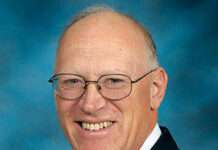June is National Men’s Health Month
MANHATTAN, Kan. – Sometimes, society’s norms make it more difficult for men to take care of their health.
“We’re told to brush it off, walk it off, don’t cry, don’t show your true feelings…,” said Brad Dirks, the associate director of Kansas State University’s Physician Assistant program.
“That’s true when we talk about (physical) health, and even mental health. Those symptoms that would normally be evident are different for men. Signs and symptoms look different because we ignore them for quite a while until it becomes something that we can’t ignore.”
Dirks and colleague Elaine Johannes – the Kansas Health Foundation Distinguished Professor of Community Health at K-State – recently addressed the topic as part of Men’s Health Month, recognized annually in June.
“I’ve been married well over 40 years, and it’s hard to see the men in our lives not take care of themselves,” Johannes said. “It’s hard to also know when to intervene, when to remind, when to nudge, when to nag…and I am more and more concerned that the men in our lives are pushing so hard to provide for their families and to maintain the stamina they had when they were younger.”
Dirks noted that the leading health-related causes of death among men are – in order – heart disease, stroke, suicide, prostate cancer and lung cancer.
“We know that there are genetic links for many diseases, which you can’t control,” Dirks said.
But he added that the risk factors for common diseases are controllable. “Smoking is a risk factor for all of the top five,” Dirks said. “And, we can monitor our cholesterol, blood pressure, weight, activity and blood sugar levels.”
“We are discovering more and more links between these illnesses and the risk factors that contribute to them,” Dirks said.
Johannes said that unlike women, men don’t often talk about health amongst themselves. Pop culture is filled with images of strong men – think of superheroes like Captain America, Superman and Iron Man – who are not expected to show signs of weakness. Unwittingly, these images have caused a challenge for men’s health.
“I don’t know that men talk to each other about their health,” Johannes said. “I think the more that men are familiar with noticing their health when they’re younger, and then are willing to open up and talk about it beyond their mom and wife, the more likely they will be able to avoid or deal with diseases.”
Dirks added: “I think part of it is starting early and training young men to be open to discussing health. If it’s modeled by your father, that gives you permission. You need to start checking your blood pressure, blood sugar and cholesterol regularly at least by age 20. If it’s okay, you can go a period of time without checking it again, but if there’s a family history of problems, that should be a motivator to stay on top of it.”
Johannes and Dirks pointed out that caring for one’s health is akin to showing care for loved ones, as well.
“Wanting to be healthy for someone else is pretty powerful,” Dirks said. “Often times, we won’t do it for ourselves; we’re fairly fatalistic in many of these things. But when we realize that we have other people we care about, we may want to do it for them.”
Listen to a longer discussion with Johannes and Dirks on the weekly radio program, Sound Living, produced by K-State Research and Extension. More information on healthy living is also available from local extension offices in Kansas.
FOR PRINT PUBLICATIONS: Links used in this story
Men’s Health Month, www.menshealthmonth.org
Sound Living, https://www.ksre.k-state.edu/news/radio-network/sound-living.html
K-State Research and Extension local offices, https://www.ksre.k-state.edu/about/stateandareamaps.html
K State Research and Extension is a short name for the Kansas State University Agricultural Experiment Station and Cooperative Extension Service, a program designed to generate and distribute useful knowledge for the well being of Kansans. Supported by county, state, federal and private funds, the program has county extension offices, experiment fields, area extension offices and regional research centers statewide. Its headquarters is on the K State campus in Manhattan. For more information, visit www.ksre.ksu.edu. K-State Research and Extension is an equal opportunity provider and employer.
Story by:
Pat Melgares
785-532-1160
[email protected]
For more information:
Brad Dirks
785-532-1519
[email protected]
Elaine Johannes
785-532-7720
[email protected]





